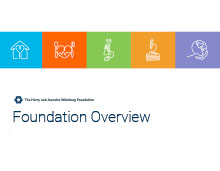Moving out of poverty is undeniably challenging, but staying out can be even more difficult. In fact, people are more likely to move up and down the economic ladder than remain in poverty.
To develop effective, community-driven approaches that address this challenge, the Weinberg Foundation and several other philanthropies — Robin Hood, Tipping Point Community, and the Bill and Melinda Gates Foundation — launched the Mobility Learning and Action Bets (Mobility LABs) initiative in 2019. The goal of Mobility LABs is to foster partnerships and networks that enable local organizations to work together to achieve positive results for community members, such as building skills and providing meaningful career and educational opportunities.
Since its launch, Mobility LABs has invested in nine communities around the country, including Baltimore City and rural Northeastern Pennsylvania — two of Weinberg’s priority communities. Three core principles guide the initiative: promoting economic stability; building leadership and self-confidence within the community; and strengthening social connections and networks for residents.
“Although each community has done something different to sustainably lift people out of poverty, all of them aim to energize and catalyze partners to more efficiently leverage each other’s resources and collaborate in a way that would not have otherwise happened,” said Earl Millett, the managing director who oversees the Foundation’s grantmaking in this area.
The initiative culminates this year with a significant evaluation of the multiyear effort and preliminary outcomes, such as the development of cross-sector partnerships to help residents achieve employment and education goals.
Spotlight on two Mobility LABs communities: Baltimore and Northeastern Pennsylvania
Baltimore
With local partner and grantee the Center for Urban Families, this Mobility LABs effort — known as Baltimore Communities Assisting and Advancing Neighbors (BCAAN) — centers on West Baltimore’s Greater Penn North neighborhood. To achieve its goal of increasing economic opportunity and helping residents overcome obstacles that keep them in poverty, the Center for Urban Families aimed to create resident-led solutions by prioritizing community partnerships and engaging community members as outreach leaders. The nonprofit encouraged residents to get involved by serving on an advisory council or participating in civic engagement activities.
The result is a network of service providers and resident advocates — including community-based organizations, higher education, government, and K–12 schools — that connect members of multigenerational households with programs focused on housing, employment, and financial stability, as well as removing barriers for individuals returning from incarceration. In addition, two neighborhood block associations have teamed up to enable more residents to access these resources. For example, one of the associations, the No Boundaries Coalition, has created a boot camp to help youth ages 13–21 become active, responsible community members. The other, Penn North Community Association, is working to address violence in the community that often stems from liquor stores in the area.
BCAAN is also part of an effort to revitalize the community by helping to transform a West Baltimore mall after its Target anchor store moved out. BCAAN spearheaded its conversion into a vital community space that now offers services such as medical care, child care, and employment and training programs.
Northeastern Pennsylvania
Grantee Commission on Economic Opportunity (CEO) is the lead local partner in this Mobility LABs effort, which involves 30 community-based nonprofits and postsecondary institutions. Together, they launched Parent Pathways, which aims to help student parents complete their education and achieve stability while connecting their children with high-quality early childhood education programs.
Parent Pathways is modeled on the Women With Children program at Misericordia University, which supports single mothers through college and provides summer camps and other enrichment activities for their children. The CEO program provides services to single-parent families struggling to make ends meet, enabling adults to complete college or training and secure a family-supporting job. It also offers advocacy training for participants and an emergency hardship fund for child care and other critical needs.
Gaining insights on effective strategies to address poverty
In addition to providing critical services in its nine communities, Mobility LABs serves as an important learning opportunity.
For example, to meaningfully measure mobility from poverty in Northeastern Pennsylvania, CEO is surveying a diverse cross-section of the community to identify the factors that influence families’ economic circumstances for better or worse. Surveys include questions on life events and experiences, such as job loss, unexpected expenses, or changes in income; measures of socioeconomic status; mental and physical health; assets and debt; and household spending. CEO also collects demographic information to better understand the challenges among different racial and ethnic groups.
“One organization or program alone cannot break the cycle of poverty,” said Anne Allen, who leads the Foundation’s Mobility LABs work. “The lessons learned from Mobility LABs will give us insights on how to enable communities to address their own challenges and foster innovative partnerships that effectively deliver and leverage the resources needed to help people achieve stability and thrive.”




